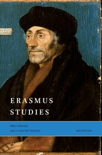
Erasmus Studies
metrics 2024
Engaging with the Past: Erasmus’ Influence on Modern Philosophy
Introduction
Erasmus Studies, published by BRILL, is a notable journal dedicated to the interdisciplinary exploration of historical and philosophical perspectives, primarily focusing on the life and works of Erasmus of Rotterdam and their impact through the ages. With an ISSN of 0276-2854 and an E-ISSN of 1874-9275, this journal serves as a critical resource for researchers and scholars in the fields of History and Philosophy, currently classified as Q4 in both categories for the year 2023. The journal's publication history spans from 1981 to the present, highlighting its long-standing commitment to academic discourse. Located in the Netherlands, at PLANTIJNSTRAAT 2, P O BOX 9000, 2300 PA LEIDEN, Erasmus Studies provides a platform for original research, comprehensive reviews, and scholarly discussions that foster a deeper understanding of the intellectual currents shaped by Erasmus and his contemporaries. Although it does not currently offer open access, it remains an essential tool for academics seeking to engage with the rich nuances of Renaissance thought and its ongoing relevance in today's philosophical landscape.
Metrics 2024
 0.10
0.10 0.40
0.40 0.30
0.30 6
6Metrics History
Rank 2024
Scopus
JCI (Web Of Science)
Quartile History
Similar Journals
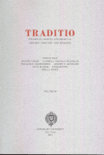
TRADITIO-STUDIES IN ANCIENT AND MEDIEVAL HISTORY THOUGHT AND RELIGION
Unveiling the Depths of Historical Narratives and BeliefsTRADITIO - Studies in Ancient and Medieval History, Thought and Religion is a distinguished academic journal published by Cambridge University Press, dedicated to the exploration and analysis of historical, philosophical, and religious narratives from ancient and medieval periods. The journal's ISSN is 0362-1529 and its E-ISSN is 2166-5508. Renowned for its rigorous scholarship, it enjoys a notable standing in the academic community, reflected in its 2023 category quartiles which place it in the second and third tiers across critical fields such as Literature and Literary Theory, Philosophy, Religious Studies, and Visual Arts and Performing Arts. With its comprehensive scope that encompasses multidisciplinary approaches, TRADITIO provides an essential platform for researchers, academics, and students alike to engage deeply with the complexities of historical thought and cultural practices. Although the journal operates within the traditional subscription model, its significance is underscored by impressive Scopus rankings, indicating its high visibility and impact within the arts and humanities sectors. We invite you to discover the richness of ancient and medieval studies through the pages of TRADITIO.

Janus-Estudios Sobre El Siglo de Oro
Elevating discourse on literature's golden era.Janus-Estudios Sobre El Siglo de Oro is a distinguished academic journal dedicated to the exploration and analysis of the Golden Age of Spanish literature and culture. Published by SIELAE in collaboration with the University of Coruña, Faculty of Philology, this journal boasts a remarkable impact factor with a Q1 ranking in Literature and Literary Theory, demonstrating its significance in the field. Since its inception in 2012, Janus has maintained an open access publishing model, ensuring that groundbreaking research is accessible to scholars, professionals, and students alike. The journal covers a diverse range of topics within the realm of Arts and Humanities, with an admirably ranked performance in both literature and its associated interdisciplinary studies. With a commitment to showcasing critical insights and innovative research, Janus aims to contribute significantly to the scholarly discourse surrounding the Golden Age, making it an invaluable resource for anyone interested in this rich cultural period.

Studia Aurea-Revista de Literatura Espanola y Teoria Literaria del Renacimiento y Siglo de Oro
Advancing Scholarship in Renaissance and Golden Age NarrativesStudia Aurea-Revista de Literatura Espanola y Teoria Literaria del Renacimiento y Siglo de Oro, published by the esteemed Universitat Autònoma de Barcelona, stands as a pivotal academic resource in the fields of Literature and History, specializing in Spanish literature from the Renaissance and the Golden Age. With its Open Access model established since 2007, this journal ensures that groundbreaking research is readily available to scholars and enthusiasts worldwide. Notably recognized for its quality, in 2023 it achieved Q1 rankings in both History and Literature and Literary Theory, reflecting its significant contribution to advancing knowledge in these domains. The journal's Scopus rankings further underscore its impact, placing it in the top 20% for literature and the top 37% for history. As it converges from 2018 to 2023, Studia Aurea continues to facilitate critical discussions, innovative research, and the exploration of literary theories, making it an essential platform for researchers, professionals, and students alike.

Seizieme Siecle
Navigating the Cultural Shifts of the 16th Century: A Scholarly JourneySeizieme Siecle is a distinguished journal published by LIBRAIRIE DROZ SA, focusing on the rich tapestry of the 16th century—a pivotal period that shaped the arts, literature, and cultural studies. As a publication dedicated to bringing scholarly discourse to the forefront, it features a range of critical analyses and interdisciplinary studies that examine the multifaceted influences of the era. While the journal currently does not operate under an Open Access model, its commitment to quality research is reflected in its inclusion in Scopus, albeit with limited convergence years and relatively low rankings across various relevant fields in the Arts and Humanities. Researchers, professionals, and students interested in deepening their understanding of historical contexts and their artistic expressions will find valuable insights within the pages of Seizieme Siecle. With its base in Geneva, Switzerland, the journal offers a unique perspective, contributing significantly to the ongoing academic conversations surrounding the Renaissance and its lasting impact.

Revista de Letras
Cultivating Intellectual Engagement Across BordersRevista de Letras is an esteemed academic journal published by Universidade Estadual Paulista (UNESP), dedicated to the fields of Literature and Literary Theory, as well as Philosophy. With its ISSN 0101-3505 and E-ISSN 1981-7886, the journal serves as a significant platform for the dissemination of scholarly research and critical thought, particularly within the Brazilian context and beyond. Operating from Araraquara, SP, Brazil, the journal spans the period from 2004 to 2023, featuring a diverse array of articles aiming to explore various literary and philosophical discourses. Despite its current Q4 ranking in both the Literature and Literary Theory and Philosophy categories, the journal continues to foster a vibrant academic community, promoting rigorous scholarship and intellectual engagement. Researchers, professionals, and students alike are invited to contribute to and engage with the evolving narratives presented in this publication, aiming to enhance understanding and facilitate discussions within these crucial fields.
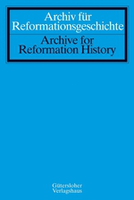
ARCHIV FUR REFORMATIONSGESCHICHTE-ARCHIVE FOR REFORMATION HISTORY
Navigating the Rich Heritage of Reformation HistoryARCHIV FUR REFORMATIONSGESCHICHTE - ARCHIVE FOR REFORMATION HISTORY, published by GUTERSLOHER VERLAGSHAUS, serves as an invaluable resource in the field of religious studies, particularly focusing on the historical intricacies of the Reformation era. Established in Germany, this journal has a longstanding tradition, originating in 1904, and features a comprehensive scope that includes insights and scholarly articles on the developments and impacts of Reformation history, spanning various converged years, with continuing contribution up to 2023. Despite its designation in the Q4 quartile for Religious Studies, it remains an essential platform for both emerging and established scholars. While it does not offer open access, readers and researchers benefit from the journal's curated studies which provide profound historical context and analysis. By engaging with this journal, professionals, students, and researchers alike can deepen their understanding of the Reformation's legacy and its influence on contemporary religious thought.
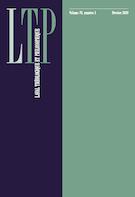
LAVAL THEOLOGIQUE ET PHILOSOPHIQUE
Nurturing Scholarly Exchange for a Deeper UnderstandingLAVAL THEOLOGIQUE ET PHILOSOPHIQUE, published by UNIV LAVAL in Canada, is a vital scholarly journal devoted to advancing the fields of philosophy and religious studies. With an ISSN of 0023-9054 and an E-ISSN of 1703-8804, this journal serves as a platform for high-quality research, reflecting the diverse and interdisciplinary nature of theological and philosophical inquiry. Although it is currently categorized as Q4 in both Philosophy and Religious Studies, its dedication to encouraging critical dialogue and innovative scholarship positions it as a significant resource for researchers, professionals, and students alike. From its inception in 2002 to its ongoing contributions, the journal has made a noteworthy impact, fostering intellectual engagement and providing a scholarly space for examining complex philosophical and theological questions. With access options predominantly through institutional subscriptions, it invites a robust academic audience to explore its thought-provoking articles and contribute to the rich tapestry of knowledge within these fields. Set against the picturesque backdrop of Quebec City, this journal embodies the vibrant academic spirit of its locale, aiming to connect scholars from around the globe.

Nova et Vetera-English Edition
Connecting scholars to the vital discourse of religious and moral philosophy.Nova et Vetera-English Edition is a distinguished academic journal published by Catholic University of America Press, focusing on the interdisciplinary studies of religious thought, moral philosophy, and theological inquiry. With its ISSN 1542-7315 and E-ISSN 2470-5861, the journal serves as a vital platform for scholars, professionals, and students aiming to explore contemporary issues through a lens of historical and modern scholarship. Although it does not currently offer open access, the journal's rigorous peer-reviewed articles are pivotal for advancing discourse in theology and philosophy, providing fresh perspectives on both classical and contemporary topics. The impact of Nova et Vetera in the academic community underscores its commitment to fostering a deeper understanding of faith's role in today’s world, making it an essential resource for anyone engaged in the study of religious and philosophical traditions. The journal is located at 620 Michigan Avenue NE, Admin Bldg Room 303, Washington, DC 20064, allowing it a prominent presence in the heart of one of the nation's leading centers of theological thought.
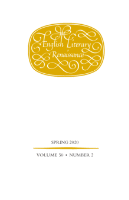
ENGLISH LITERARY RENAISSANCE
Fostering Critical Dialogue in Literary StudiesENGLISH LITERARY RENAISSANCE, published by University of Chicago Press, stands as a pivotal academic journal in the realm of Literature and Literary Theory. With a historical pedigree dating back to 1971, this esteemed journal has made significant contributions to the study of English literature, exploring a wide array of themes, methodologies, and critical interpretations that underscore the richness of literary discourse. The journal is ranked in the Q2 category for literature and literary theory and is positioned in the 89th percentile in the Scopus rankings, affirming its impact within the field. Although it does not operate under an open access model, ENGLISH LITERARY RENAISSANCE continues to attract a vibrant community of scholars and educators eager to engage with its rigorous scholarship and innovative approaches. This journal not only serves as a platform for groundbreaking research but also fosters critical dialogue that shapes the future of literary studies.
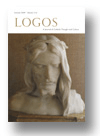
LOGOS-A JOURNAL OF CATHOLIC THOUGHT AND CULTURE
Empowering Voices in the Study of Catholic CultureLOGOS - A Journal of Catholic Thought and Culture is a distinguished publication dedicated to exploring the intersection of Catholicism with contemporary cultural, literary, and philosophical discourse. Established in 2002 and published by the University of St. Thomas, Center for Catholic Studies, this journal serves as a vital platform for scholars and practitioners involved in the study of religion, culture, and the humanities. With its ISSN 1091-6687 and E-ISSN 1533-791X, LOGOS features rigorous peer-reviewed articles that delve into critical discussions in the realms of Cultural Studies, Literature and Literary Theory, Philosophy, and Religious Studies. The journal is currently positioned in the Q3 quartile for Cultural Studies and Philosophy, and Q2 for Literature and Literary Theory and Religious Studies, reflecting its significant contribution to these fields. Although LOGOS does not offer Open Access options, its scholarly output is essential for those seeking to engage with Catholic thought in a dynamic cultural landscape. Join a community of researchers, professionals, and students as you navigate the rich intellects that shape Catholic culture today.